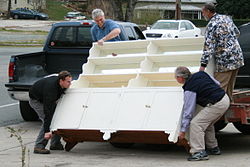heavy (noun) /ˈhɛv.i/
(slang) A villain or bad guy; the one responsible for evil or aggressive acts.
(slang) A doorman, bouncer or bodyguard.
(journalism, slang, chiefly in the plural) A newspaper of the quality press.
(aviation) (Should we move, merge or split(+) this sense?) A relatively large multi-engined aircraft.
heavy (verb) /ˈhɛv.i/
(often with "up") To make heavier.
To sadden. (Can we add an example for this sense?)
(Australia, New Zealand, informal) To use power or wealth to exert influence on, e.g., governments or corporations; to pressure.
heavy (adjective) /ˈhɛv.i/

(of a physical object) Having great weight.
(of a topic) Serious, somber.
Not easy to bear; burdensome; oppressive.
(of a rate of flow) High, great.
(slang) Armed.
(of music) Loud, distorted, or intense.
(of weather) Hot and humid.
(of a person) Doing the specified activity more intensely than most other people.
(of the eyes) With eyelids difficult to keep open due to tiredness.
(of food) High in fat or protein; difficult to digest.
Of great force, power, or intensity; deep or intense.
Laden to a great extent.
Laden with that which is weighty; encumbered; burdened; bowed down, either with an actual burden, or with grief, pain, disappointment, etc.
Slow; sluggish; inactive; or lifeless, dull, inanimate, stupid.
Impeding motion; cloggy; clayey.
Not raised or leavened.
(of wines or spirits) Having much body or strength.
(physics) Containing one or more isotopes that are heavier than the normal one.
(petroleum) Having high viscosity.
(finance) Of a market: in which the price of shares is declining.
(nautical, military) Heavily-armed.
(aviation, of an aircraft) An adjective "heavy" refers to an object or aircraft with a high takeoff weight and payload, particularly those with a maximum takeoff weight exceeding 300,000 tons, which often leads to the generation of high wake turbulence.
heavy (adjective) /ˈhɛv.i/
Having the heaves.
heavy (adverb) /ˈhɛv.i/
In a heavy manner; weightily; heavily; gravely.
(colloquial, nonstandard) To a great degree; greatly.
(India, colloquial) very